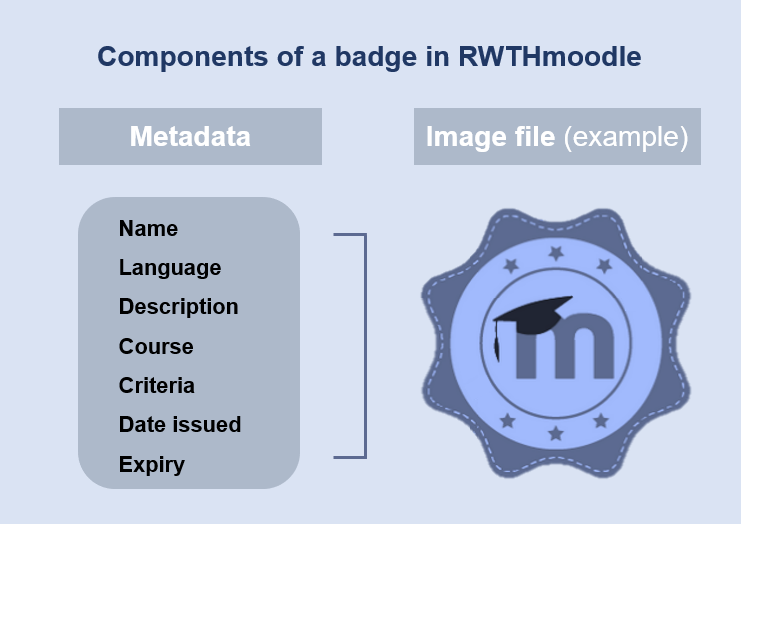General info on badges

Badges are digital learning awards that prove the existence of certain knowledge and competencies. In this respect, badges represent a further development of classic certificates, which are acquired, for example, after successful participation in a training course or an examination.
In RWTHmoodle, badges can be awarded, for example, after the successful completion of an activity or a course. Accordingly, badges, similar to e.g. LevelUp! or the progress list, belong to the elements of "gamification". This is a concept for increasing motivation, in which game-typical elements such as experience points or digital badges are applied in non-game contexts. Badges are usually represented in RWTHmoodle by an image file that can be freely selected by the lecturer and supplemented by additional information. These contain, among other things, the date of issue as well as the criteria necessary for badge acquisition.

Content
1. What is a badge?
2. What are badges good for?
3. RWTHmoodle und Open Badges
4. Where can badges be used in RWTHmoodle and what types of badges are there?
5. What are the requirements for using badges in a course room?
6. How can I create a badge in RWTHmoodle?
In media-based teaching-learning contexts, a badge is a visual representation of achievements or competencies. In addition to a graphic symbol (usually a digital badge in PNG format), a badge also contains a set of information in the form of metadata that provides information about what the student has learned, when the badge was earned, and, if applicable, how long the badge is valid.

The origins of badges can be found in the world of (video) games. In virtual game worlds, the player is often rewarded with badges for a specific action. These can be trophies or special badges, for example. The badges are meant to serve as a motivating goal to induce desired behavior. Badges collected by players are listed in a badge collection, comparable to a scrapbook.
In RWTHmoodle, the acquired badges are transferred to a badge overview according to this principle, so that students can track their individual progress.
In RWTHmoodle, badges are particularly suitable as a motivational aid for opening up the learning content provided. The use of badges offers the following advantages, among others:
- Through the incentive to acquire a badge and to gradually expand the personal badge collection, their use leads to a more intensive and prolonged engagement with the learning content.
- Badges offer the possibility to easily package smaller and optional activities in RWTHmoodle. The inhibition threshold to work on the learning content is thus lower. At the same time, a badge can serve as a motivating goal.
3. RWTHmoodle und Open Badges
Badges in Moodle follow the Mozilla Open Badges approach. Open Badges is a free standard that allows badges to be acquired from any university or other educational institution worldwide and organized and shared as a personal badge collection in a common location called a "Backpack". If required, the acquired badges can be shared on a social network such as LinkedIn or Xing or attached to an online application.
Every digital badge created in RWTHmoodle fulfills the Open Badge Standard due to the information to be stored. This means that other platforms can access the standardized metadata of the badges issued in RWTHmoodle, provided that the students make their acquired badges available to them.
Open Badges promote student autonomy in terms of selecting, sharing, and organizing digital learning and competency credentials. This idea goes beyond the pure gamification approach of badges as a motivational tool. Since the acquisition of badges in RWTHmoodle may not serve as the accreditation of skills and knowledge, RWTHmoodle currently does not offer students a connection to an external backpack or any other download option for the badges.
4. Where can badges be used in RWTHmoodle and what types of badges are there?
In RWTHmoodle a distinction is made between course-specific and global badges.
4.1. Course-specific Badges
Course-specific badges can be used in each RWTHmoodle course room. These are awarded for special achievements. These can be:
The successful completion of certain activities - any number of course room activities can be defined that can be completed and are required to earn the badge, for example, a passed test. Several activities can be selected at the same time.
By linking several activities, topic-specific badges can be created. For example, you can bundle all badges of a certain course section into one progress-related badge or assign activities with the same content (for example, all tests) to one task-related badge.
Successful completion of the entire course - the badge is awarded when the course is completed by the student. The criteria for completion of the course is determined on a course-specific basis.
Awarded Badges - If students have already earned certain other badges in the same course room, they will be awarded an additional badge, called the "upper badge".
Manual awarding of badges by lecturers for special achievements.
4.2. Global Badges
In addition, there are global badges. These are available system-wide and are awarded for special achievements at system level, for example, the successful completion of several courses.
Note
5. What are the requirements for using badges in a course room?
Unless you want to award badges exclusively to students manually, the use of activity completions is a necessary prerequisite for the use of badges.
6. How can I create a badge in RWTHmoodle?
The creation of a badge in Moodle can essentially be divided into two steps.
- Definition of the image file and the associated metadata. With regard to the visual design of the badge, there are no specifications or templates. The visualization of the badge is left exclusively to the lecturers. You can use an icon, an illustration, a photo or an image for this purpose. Make sure that the design of the badge is perceived as coherent with the content.
The metadata includes the badge name, a description text, and an expiration date if applicable. An expired badge is indicated by a visual change to the image file. In addition, each badge is stored with the information that it was awarded by RWTH Aachen University. This information about the issuing institution is the same for every awarded badge within RWTHmoodle and cannot be changed by the lecturers.
- Definition of the criteria that must be fulfilled for the acquisition of the badge. This involves specifying what needs to be done in order for students to receive the badge, for example, successfully completing a particular activity. These criteria are then identified in the badge metadata along with the other information to be defined in step 1.
Note

See also:

